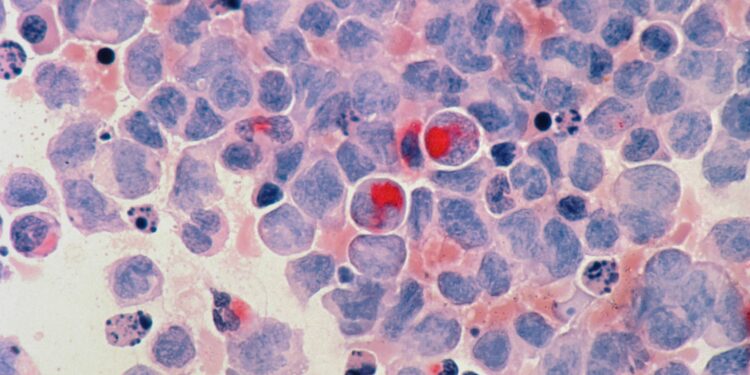Credit: Unsplash/CC0 Public domain
Cedars-Sinai Cancer researchers analyzed cells from triple-negative breast cancer tumors before and after radiation with immunotherapy, identifying three groups of patients with different responses to treatment. Their study, published in Cancer cellfound that for some patients with this difficult-to-treat cancer, radiation therapy combined with immunotherapy could produce the best anti-tumor immune response before surgery.
“Our most important finding was identifying these three different patient groups,” said Simon Knott, Ph.D., co-director of the Applied Genomics Shared Resource at Cedars-Sinai Cancer and senior author of the study.
One group, Knott said, did not respond to therapy at all, another responded well to immunotherapy, and another responded only to immunotherapy and radiation therapy. “This could help us use our most aggressive treatment options only when we need them most,” Knott said.
Triple negative breast cancer is so called because its cells are negative for receptors for the hormones estrogen and progesterone and for a protein called HER2. These tumors, which make up 10 to 15 percent of breast cancers, grow and spread more quickly than other types and, in general, have fewer treatment options.
Patients with triple negative breast cancer usually receive treatment to shrink their tumors before undergoing surgery. Immunotherapy, which uses a person’s immune system to fight cancer, is part of this presurgical treatment.
“Triple-negative breast cancer is the only type of breast cancer that we treat with immunotherapy,” said Stephen Shiao, MD, Ph.D., co-director of the Cancer Therapeutics Program at Cedars-Sinai Cancer and first author of the study. “Unfortunately, only 20 to 30% of patients respond to immunotherapy alone. Combining it with chemotherapy increases the response to 60% but exposes patients to significant toxicity.”
To determine whether a combination of radiation therapy and immunotherapy would improve patient response, investigators launched a clinical trial. During the trial, they looked at tumors from 34 patients with triple-negative breast cancer.
Patients underwent biopsies before treatment, after one immunotherapy treatment, and after a second treatment of immunotherapy plus radiotherapy. The investigators then analyzed the biopsied tissues.
They used single-cell genetic profiling to identify cancer cells and the different types of immune cells that make up each tumor. They also studied the proteins expressed by the cells, mapping their positions and providing a better understanding of how different cells interact.
The analysis yielded profiles for three types of respondents, Knott said.
“We found that tumors from patients who did not respond at all to presurgical treatment did not contain any immune cells, and tumors from patients who responded immediately to immunotherapy were filled with certain types of immune cells,” Knott said. . “This was not surprising. But we found another group of patients with tumors that looked very similar to the tumors of non-responders and did not respond to the first round of immunotherapy.
“However, they responded after the combination of immunotherapy and radiotherapy. After the combination therapy, immune cells invaded the tumors and the tumors shrank.”
Dan Theodorescu, MD, Ph.D., director of Cedars-Sinai Cancer and distinguished chair of PHASE ONE, said the study results suggest that radiation therapy may have a positive impact on the immune response of these tumors.
“This study will guide researchers toward the next generation of clinical trials,” Theodorescu said. “Researchers also describe a new framework for mapping the distribution of immune cells in tumors, which could help us identify new precision medicine approaches for patients with breast and other cancers.”
The investigators’ next task is to find practical ways to identify these responder groups in a clinical setting via blood samples or other means to better tailor treatments. They will also explore the possibility of combining radiation therapy with other types of immunotherapy before surgery to improve the response of high-risk patients, Shiao said.
More information:
Theodorescu et al, Single-cell and spatial profiling identifies three response trajectories to pembrolizumab and radiotherapy in triple negative breast cancer, Cancer cell (2024). DOI: 10.1016/j.ccell.2023.12.012. www.cell.com/cancer-cell/full… 1535-6108(23)00440-3
Provided by Cedars-Sinai Medical Center
Quote: Investigators profile three treatment response trajectories to approach triple negative breast cancer (January 8, 2024) retrieved January 8, 2024 from
This document is subject to copyright. Apart from fair use for private study or research purposes, no part may be reproduced without written permission. The content is provided for information only.



